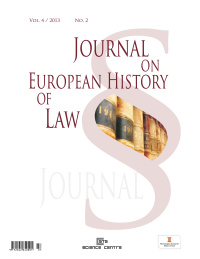Magic, Religion and Superstition in the Tetrarchy
Magic, Religion and Superstition in the Tetrarchy
Author(s): Adolfo Bautista CremadezSubject(s): Law, Constitution, Jurisprudence
Published by: Evropská společnost pro právní dějiny, z.s.
Keywords: Diocletian; magic; superstition; persecutions; Alexandria; Dominate.
Summary/Abstract: The study of certain practices related to the world of the supernatural in antiquity is a way to approach culture, society and power through history. "Religion", "magic" and "superstition" are means of connection between man and the spiritual world, focused on different ways throughout history. The Roman was a deeply superstitious man. An amalgam of rites and beliefs were settled in Roman culture during the Empire -Christianity being one of them- which bloomed in the crisis of the third century, changing social, cultural and legal relationships. Diocletian tried to face all this. He persecuted Christians, Mani’s followers, alchemists and astrologers. Traditionally there are two complementary explanations: Diocletian’s superstition (influenced or not by his colleagues) is proved with many other acts and imperial regulations as well as the need to strengthen the adhesion around the new power system established (Dominate) by a return to traditional religion. But in connection with this, a purely political interpretation lies since the centre of all these beliefs was the city of Alexandria, where there was a particularly cruel repression and that at the same time had been the origin of Domitian Domitius’ insurrection against Tetrarchy.
Journal: Journal on European History of Law
- Issue Year: 4/2013
- Issue No: 2
- Page Range: 90-92
- Page Count: 3
- Language: English

